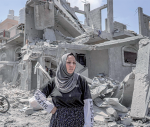You are here
Field hospital offers best choice, hope for Syrians on the other side
By Abeer Numan - Jul 04,2015 - Last updated at Jul 07,2015

A view of the town of Tal Shihab across the northern Syrian border which serves as a passage for injured Syrians who initially receive treatment at a military-run field hospital deployed on the border (File photo)
NORTHERN BORDER — Family members walk across the berm marking the northern border between Jordan and Syria, to take home the body of a relative who has died at Ramtha Hospital, succumbing to war injuries, so as to be buried in his homeland, Syria.
The body of the man, identified as Jihad, was wrapped in white cloth. It has just arrived at Tal Shihab field hospital from Ramtha Hospital after attempts to save his life have failed.
Six family members carry the body over their shoulders and walk back across the berm where the majority of nearby Syrian towns have been recently captured by the Free Syrian Army.
It was around 1:00pm on Wednesday when the body's handover took place at the site of the field hospital where family members were inspected by army personnel upon arrival at the handover spot.
With just around 300 metres away from Syria, a Jordanian military field hospital has been set up since the beginning of the crisis to provide medical assistance for Syrian casualties, mainly civilians who have been suffering the brunt of battles there.
"We spare no efforts to try to save them no matter how critical their cases are," a field hospital surgeon from the Royal Medical Services (RMS) told The Jordan Times.
Three days ago, we received a woman with her two children, a girl aged 8 and a boy aged 10, he recalled. The girl suffered third-degree burns (which are the worst), and the boy had a wound in the back of his head, he said.
"I had to stitch up the wound for him, and they were transferred to Ramtha Hospital for further treatment," he said, pointing out how acute the cases received are.
It seemed part of their house had collapsed on them. The mother, around 40 years old, was covered with white dust and she was crying over her children, and we allowed her to accompany them to the hospital as patient escort, he continued.
“Many of the cases are critical; they need immediate surgeries and many cases need reconstruction surgery, and perhaps a series of operations,” the RMS surgeon elaborated, pointing out that there are also those who don’t make it.
“It is a humanitarian role. Border guards and international organisations carry out a humanitarian role,” a military commander said, highlighting how important it is to save people’s lives. The hospital receives all injuries, both civilians and fighters, people of all ages, children, adults and old people and the numbers vary, depending on the intensity of battles there, he said, as the sounds of heavy shelling and barrel bombing continued to be heard every now and then.
They come here because medical capabilities are not always readily available and sometimes there are power cuts there, he explained.
On average, we receive 20 cases a day; that is like 600 cases a month,” he said, adding that critical cases are usually transferred to nearby hospitals, depending on the severity of the situation.
The border field hospital started as a mobile clinic at the beginning of the crisis in Syria and when the RMS realised how vital it was to provide immediate humanitarian services, it set up the field hospital with the support of humanitarian agencies, like the ICRC and IOM Jordan.
The medical facility, staffed by RMS surgeons and nurses on a rotation basis, administers first aid and performs operations, if urgently needed, depending on a patient’s condition and the time they have.
Built on an area of around two dunums, the hospital comprises a 12-bed patient reception ward, an intensive care unit that can accommodate three patients and an operations room, besides an external large hall.
The military post at the northern border, overlooking Daraa, is a sensitive area and only casualties and people with infirmities are now allowed in through the berm for medical assistance, according to military officials.
Syrian refugees are now only allowed to enter through Ruweished near the eastern border, due to security concerns, a military commander indicated.
Since the beginning of the crisis in Syria, which has now entered its fifth year, the number of registered refugees entering Jordan has reached around 600,000, while the overall number of Syrians in Jordan is put at 1.5 million.
Related Articles
AMMAN — Royal Medical Services (RMS) Director General Maj. Gen.
Forty Jordanian doctors took part in a three-day seminar this week aimed at training participants on aspects related to surgery in time of war.
AMMAN — Tens of thousands of people are in need of urgent assistance in a border area between Syria and Jordan, the International Committee















